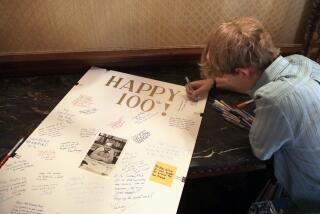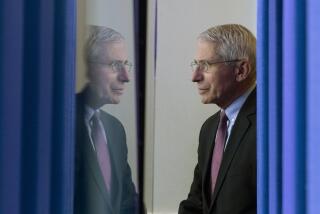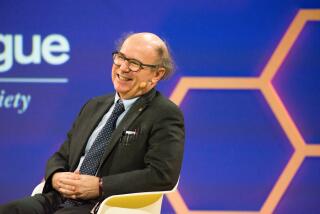Scientist’s Evolution : Biologist Walter Fitch, One of UCI’s Newest Stars, Still Looking for Challenges--and Answers
- Share via
Who knows why or when a child’s mind switches from the more mundane pleasures of youth and fixes on something as weighty as science?
Even as he tries to pinpoint the moment when it happened to him, renowned molecular evolutionist Walter Fitch can only make some educated guesses as he thumbs through the pages of his childhood. He knows that part of the answer is that he was a scrawny kid who realized early on that if he were to leave footprints, they wouldn’t be on the athletic field.
Ah, but books. With them, he was as swift as the other kids. With them, his mind raced.
One of them he read as a child was a single-volume encyclopedia. On one page were lots of little drawings.
“Every drawing had a flaw that violated something about nature,” Fitch said. “For example, one had a flag and a smokestack beside each other, and the flag was clearly blowing one direction and the smoke was blowing in another direction. You were supposed to figure out what the flaw was. Those just fascinated me, and I remember poring over them, figuring out what was wrong with each of those pictures. And I started asking questions. My mother must have been very patient, answering my questions of ‘Why?’ ”
Young Walter Fitch never really stopped asking why, coming to realize with each passing year the wisdom in the aphorism he heard as a child--namely, that every time a scientist answers a question, he raises 10 more.
He put that bit of truth in his knapsack and has kept it all along the trails of his life--trails that have led him now, at age 60 and the father of three grown children, to a perch among the tall trees that represent the country’s leading molecular evolutionists.
These are the scientists still tracking the 3 1/2-billion-year-old evolutionary history of the species. While early evolutionists studied the evolutionary chain largely through fossil remains and by comparing the physiology of species, molecular evolutionists study it under a microscope, examining similarities and differences in species’ molecular compositions.
Now a professor at the University of Southern California, Fitch will join UCI’s department of ecology and evolutionary biology around Oct. 1 at an annual salary of $93,000.
A member of the prestigious National Academy of Science, Fitch would add weight to a UCI department that already includes nationally respected population geneticist Francisco Ayala, himself a member of the NAS’s hierarchy.
Fitch’s move down the San Diego Freeway to Irvine will come after only three years at USC, a tenure that followed nearly a quarter-century at the University of Wisconsin, where he began his academic career as an assistant professor.
Fitch has become a hot property in a field of science where the final answers lie not around the corner but most likely into the next century and beyond. Prestige and money are to be had for the people who know how to get those answers.
At Wisconsin, they didn’t need the chemistry building to fall on them to see it coming. Ultimately, said Harry Karavolas, the chairman of the physiological chemistry department where Fitch built his reputation, the school couldn’t afford him.
“Walter started to develop into an international scientist, and the campus has got limited resources here,” Karavolas said. “The last few years was when he really grew, and at that time he was looking for bigger and better things. Those bigger and better things were not available here on campus. Our highest-paid professors, and some are Nobel Prize winners, didn’t get the money he got at USC.” Karavolas said Fitch doubled his Madison salary when he moved to Los Angeles. Fitch said only that USC made him an offer he “couldn’t refuse.”
But Fitch left on a wave of good will. He is remembered in Madison as a quick-witted, unassuming professor who “represented the Wisconsin idea, where professors don’t wear their epaulets on their shoulders,” Karavolas said.
And while Fitch said he now envisions retiring at UCI (just as he had once expected to retire at USC), Karavolas isn’t so sure. “He’s now in that group of scientists who basically aren’t attached to any university. They go from place to place representing a group that’s pursuing a particular area of science that knows no bounds.”
Indeed, Karavolas humorously suggested, one of the most important things a prospective employer can offer scientists of Fitch’s caliber is “access to a good airport.”
Leaning back in his chair in his rather spare laboratory/office at USC, Fitch is not overdressed for a scheduled interview. He is wearing a pullover shirt, shorts and tennis shoes and is munching on an apple. In the background, classical music plays low on a portable radio that sits under bookshelves with tomes on genetics and molecular biology. All in all, quite a snapshot of the Scholar As Everyman With Classical Tastes.
But he’s not affecting a pose--a former colleague at Wisconsin said that had you walked in unannounced on Fitch in his Madison office during the summer, that’s probably what you’d have seen, too.
“The only thing he might pontificate about is vocabulary and language,” Karavolas said. “He studies words. In seminars, he would correct students to be sure they were precise (in their language). Students used to be fearful of him. He’d really jump in on them; they had to be on guard, and sometimes they were intimidated.”
And while he now might be summoned to lecture anywhere in the world, Fitch said, there was a time when he wondered whether he would ever amount to anything.
“What I was worried about first was whether I would ever get a good idea,” he said, reliving the memory of a calculus class where the teacher had given the students a puzzling task. Fitch approached the assignment with relish.
“I figured it all out and realized there was a pattern I could construct (to solve the problem). I took it in to the teacher very excitedly, showed him what I had and said, ‘I can figure out any of these things real easy now.’ He allowed as how everything I said was correct but that Blaise Pascal had discovered this about 400 years ago. I probably should have been heartened that I had discovered something all by myself and that therefore perhaps I had a little gift, but I went out of there crushed. I said, ‘I’m 400 years behind time; how will I ever catch up?’ ”
As a scientist, of course, Fitch knew all about quantum leaps. By 1967, he had made his, publishing a paper while at Wisconsin that won him public attention. Until then, evolutionists had related organisms on the basis of appearance, such as their anatomy or physiology. But Fitch published one of the first papers that used molecular sequences of proteins to infer the relationships among such diverse organisms as plants, insects, fungi and vertebrates.
It was the kind of study that infuriates creationists but won plaudits among scientists because it shed more light on the historical time line that evolutionists believe connects all living things.
In what he describes today as a relatively simple series of tests, Fitch had helped verify at the molecular level what biologists had spent hundreds of years doing by looking at physical characteristics.
“He (Fitch) hasn’t been a hands-on biologist, but he’s sat back and tried to put the pieces into a larger puzzle,” said UCI associate professor Richard Lenski, who said he has met Fitch on three occasions and who will be a colleague when Fitch reports to the campus.
“One of the difficulties in molecular biology is that you’re essentially dealing with trying to make inferences from historical data. So DNA and protein sequences give information about what organisms are closely related to one another, but it’s difficult to simply sit down and look at it and make sense of it. . . . What Fitch brings to it is rather than focusing on a particular data set and dealing with that, he focuses on how one should even go about analyzing the type of data molecular biologists and evolutionary biologists are trying to get.”
That’s exactly how Fitch sees himself. To use computer language, he is someone who knows, in effect, how to set up workable programs to make use of the available data.
On a chalkboard in his office at USC, Fitch has drawn something that looks no more complex than an upside-down cactus--with a trunk and various branches. But it serves as a working model for his study of changes in the human influenza virus over the last 50 years, the subject of a five-year research grant he has received from the National Science Foundation that he will continue at UCI.
The tree represents a genealogy of the mutating virus, which Fitch put together after looking at genes from flu viruses that had been isolated in patients between 1933 and 1985. Fitch’s methodology has shown how the virus has changed and how rapidly. “As soon as you are infected with the virus, your immune system says, ‘Hey, there’s a stranger here,’ and starts to make stuff to fight it,” Fitch said. “What this (his study) represents in our mind is that the virus is changing its coat so you can’t recognize it. Of course, you can recognize it as being different, and then you’ll make antibodies to the new coat.”
But that delay, caused by the flu virus’s ability to mutate, can give it another few weeks to make life miserable. Part of what fascinated Fitch was that the genealogy of the flu virus didn’t look like that of any other virus he had seen before. The influenza virus, rather than succumbing to the body’s attacks to fight it off, tries instead to outrun it.
Figuring out a way to plot that on paper is the kind of challenge that keeps him coming back to the office.
“In a sense, this almost ceases to be a job,” Fitch said. “For us, it is more play than most people’s jobs because it’s new. The reason jobs become jobs for other people is that they’re doing repetitively what may well have been an exciting thing for them to have learned how to do, but once you’ve done it 100,000 times, it just doesn’t quite give you the same jolt it did the first time.”
While research is Fitch’s forte, he will also teach undergraduates at UCI. “Just being around the kids is a good thing, but if you’re going to do even half-good a job, you have to really spend some time on the material,” he said. “If it’s a field like molecular biology, it advances so quickly that it forces you to keep up. It’s not like medieval history, where the history hasn’t changed since last year. In this case, it changes and it’s really necessary for your competitiveness in the field to stay abreast. The tendency when you focus on your research is to learn only about things that directly impinge immediately on your research.”
After a childhood divided between California and the East Coast, Fitch packed up his curiosity and went to UC Berkeley, where he majored in chemistry, became politicized and lived in an integrated rooming house that left him with, among other things, a lifelong appreciation for jazz. Then it was off to post-doctoral work at Stanford and University College in London before beginning his professional academic life at Wisconsin.
During the Vietnam War, the University of Wisconsin got a reputation for having one of the more strident anti-war student bodies. The tensions crested when a graduate student was killed by a bomb planted in a research lab by a radical protester.
Fitch, who had liberal political leanings but not to the point of activism on campus, said the experience affected everyone on the Madison campus. “The Vietnam opposition voiced by the student (who planted the bomb) was characterized by escalating rhetoric. Nobody really thought to ask the question what if deeds matched the rhetoric,” Fitch said. “Suddenly, everyone was terribly horrified by the fact somebody died, and it was the natural consequence of believing one’s own rhetoric because it had gotten totally out of hand. And suddenly a pall came over the campus and that really ended the student (protest). . . . It just so shattered everybody. They suddenly realized it had these consequences. . . . It’s not that the campus did a flip-flop, but it dampened the fires.”
Fitch’s liberal politics took a more conventional route. He has served on both local and regional planning commissions, first while a post-doctoral student at Stanford and later in Madison. He also was a ward organizer for the county Democratic Party in Madison.
Colleagues in Madison said he developed a reputation as someone who could work with opposing factions.
“The only time he gets riled up,” said former colleague Karavolas, “is if someone doesn’t want to listen to reason and work out a position. He’ll get frustrated when he can’t employ Socratic means to try to convey an idea to you.”
But then, Karavolas recalled, someone would say, “Walter, you’re getting far too serious. Calm down,” and Fitch would laugh at himself.
“Walter is a great guy. I miss him,” Karavolas said. “I miss his personality, his easy wit. Many times when things would get sticky, he had a way of cracking people up and getting us all to see things in perspective.”
Which is what Fitch’s life’s work is really about.
His evolution as a scientist is, in some ways, quite clear and direct. The encyclopedia he read as a child begat a microscope (“I put everything under it”), and the microscope begat a chemistry set (“I mixed everything in it”).
The chain remains unbroken today. “There’s always information out there we don’t know,” he said. “And if you ask the right questions, you can suddenly comprehend a large fraction of information. What you’re out there to do is solve puzzles.”






